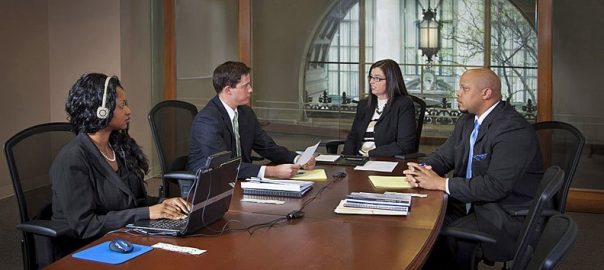You have been called upon to give sworn testimony via deposition. Thorough preparation on your part is essential. Following are answers to frequently asked questions along with some tips and tricks to make your deposition go smoothly.
DEPOSITION FAQ’s
- What is a deposition?
A deposition is the process of giving sworn testimony. It is an opportunity for a lawyer to examine a witness or party under oath.
- Who can be deposed?
Any person (or entity) with knowledge of discoverable information regarding the lawsuit.
- Why is a deposition important?
A deposition allows a party to:
- Pin down another party or a witness.
- Eliminate surprises at trial.
- Find other witnesses or evidence.
- Preserve testimony for trial.
- Evaluate the credibility of the deponent.
- Obtain information from nonparty witnesses.
- Preserve testimony of witnesses who may be unavailable at trial.
- Challenge the testimony of the party or witness.
- Evaluate the strengths and weaknesses of their case and their opponent’s case.
- Where will my deposition take place?
Depositions typically take place in the conference room of the attorney for the party being deposed. While there is some bit of maneuvering as to where a deposition will take place, tradition dictates that your deposition is to take place at your lawyer’s office.
Additionally, in Oregon, you can only be deposed in the county in which you live. For example, if you live in Multnomah County and are noticed to appear in Washington County, you may be able to object to the location of the deposition.
- Who will be in the room?
All parties to a lawsuit and their respective attorneys are allowed to attend a deposition. The deponent (person being deposed) will be present and is also allowed to have their attorney in attendance. There will also be a court reporter and, possibly, a videographer.
- When are depositions usually taken?
A deposition can be taken at any time after an appearance is due from a defendant in a case, usually 30 days after service of the summons and complaint.
The timing of depositions is also dependent on the case and strategic issues.
DEPOSITION QUICK TIPS
Always tell the truth. Prior to beginning your deposition, the court reporter will place you under oath. Lying or being untruthful will only make a situation worse.
Answer only the question that is being asked. The examiner is not your friend. You are not to volunteer information or help the examiner in any way. This is not the time for oversharing.
Wait for the entire question to be asked before responding. There is nothing worse than doing the lawyer’s job for him – listen to the entire question and don’t answer what you think he is asking.
If you do not understand a question, ask the attorney to clarify it. Again, the lawyer is asking you questions. Do not help him out by guessing at what he is asking you.
Do not ever guess or estimate. What you say in a deposition will follow you for the rest of the case – a poor guess at a deposition may undermine you at trial.
Speak slowly, calmly, and confidently. Be aware that the deposition is likely recorded and can be played back at trial. Regardless of the questioning keep your composure and remain calm.
Do not argue, get mad, swear, or raise your voice. Assume that this deposition transcript will be published on the front page of the New York Times – how do you want to come across to a jury of your peers?
Sit up straight and dress appropriately. You want to be comfortable yet professional. In my experience, dressing the part aids your confidence which leads to a less stressful deposition. In some cases, your deposition may be videotaped and you will want to look pleasant for the jury.
Answer only as to what you know. For example, if you are asked to provide the names of all persons present at a meeting but you cannot remember the names of all parties in attendance, answering “I cannot recall” is appropriate. If you are asked to state the names of all persons present at a meeting that you did not attend the proper response is “I do not know”.
Ask to see exhibits. If an examiner asks you about a document, always look at it before answering questions. Be careful to make sure that the document is accurate – if it is not, say something.
If you need to take a break ask for a break, or nudge your lawyer.
If you make an error, tell your attorney so it can be corrected during the deposition. There is nothing worse than leaving an incorrect statement on the record. Be sure to talk to your lawyer at a break and correct whatever errors there may be. It is easier to fix at the deposition than in the middle of trial.
Never say “never” or “always”. There is always an exception and, if you are too absolute, a smart adverse attorney will find it and undermine your credibility.
Preparation is the key to being an effective witness so make sure that you discuss any areas of concern with your attorney and review all pertinent documents prior to your deposition.
© 9/18/2018 Hunt & Associates, P.C. All rights reserved.
Article Source: http://EzineArticles.com/10010921



